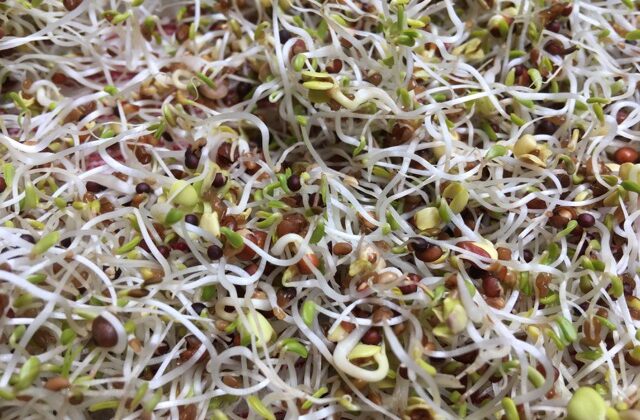Garden in a Jar
By Susannah Wood
A cold spring and pandemic woes have had many of us hankering for fresh greens. Of course, we’ve been cutting down on trips to the store, and so it was a lucky day when I noticed an unopened package of organic sprouting seeds on our pantry shelves. Since then we have been enjoying delicious, nutritious fresh sprouts on and in all sorts of dishes and salads. There has been something very satisfying, too, about a pint-sized indoor gardening project. Google “sprouts” and you may find yourself raising an eyebrow over all the health benefits they are supposed to provide, but there seems no question that they are little powerhouses of good things: protein; vitamins A, K, C, folate, niacin, thiamin, and riboflavin; omega-3 fatty acids; the minerals potassium, magnesium, calcium and iron; and fiber, plus a number of enzymes important to digestion! All of this and low in calories, too.
Sprouting is the perfect novel coronavirus activity. Soak the seeds overnight, rinse thoroughly and drain thoroughly. Put in a big mason jar with a lid of cheesecloth on top and put in a dark place like a closed cabinet or closet or cover with a dish towel on a counter. Rinse thoroughly twice a day with a vigorous stream of cold water and again drain thoroughly. In hot weather, rinse more often. After 3-5 days, depending on the seeds, they will have sprouted long roots and little leaves (actually pre-leaves). Bring them out and spread on a towel in a sunny spot so they can green up a bit and dry for a few hours. Then refrigerate in a closed container and eat soon. Rinsing and draining well are important to keeping the sprouts damp and also unspoiled.
While in the past there have been some outbreaks of food-borne illness linked to sprouts, those seem mostly associated with commercially grown sprouts. Only buy organic seeds meant for sprouting as they have been tested for bacteria and are subjected to more rigorous growing conditions than non-organic seeds. They can be found online and at health food stores. If you are at all concerned, just eat your sprouts in cooked food or you can sanitize seeds before soaking as follows: heat a pan with a solution of 3 percent hydrogen peroxide to 140 degrees Fahrenheit. Use a cooking thermometer (preferably digital) to maintain this temperature during treatment. Put the seeds in a strainer and submerge them for five minutes, swishing them around several times. Rinse seeds in cold water for a minute. Use fresh peroxide for each batch. You can also use a weak bleach solution. Directions for that method can be found online.A good guide to sprouting can be found here: http://concordfoodcoop.coop/documents/CFC2016SproutProductionPrint.pdf

